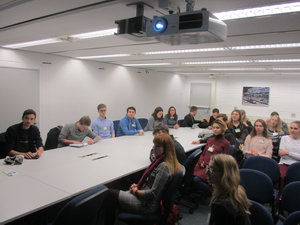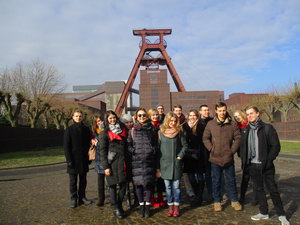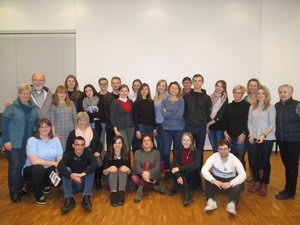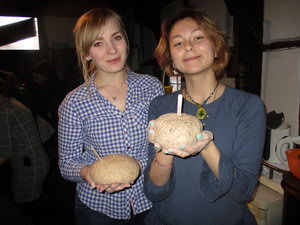Vilcha – the resettled village”: the second part

From 28th February to 6th March 2018, the second part of the project “Vilcha – the resettled village” was held in Germany. During the first part of the project, that was taken place in Ukraine, German-Ukrainian group visited village Vilcha of Kharkiv region where the participants researched the experience of the resettlement from the Chornobyl exclusion zone after the ChNPP accident and from the territories of Luhansk and Donetsk regions as a result of the military conflict continuing since 2014. The young people from Ukraine and Germany, in joint groups, conducted interviews with the resettled people and shot a video of the village and its residents’ life.
The second part of the project started at the Ruhr University of Bochum with the presentation of the resettled people’s stories prepared by the participants of the project on the material collected in Vilcha. These presentations have become the basis for the creation of historical album “Vilcha – the resettled village” which will contain stories of the resettled people living in this village. The participants also have been working on the film about Vilcha’s life that will be presented at the end of the project. 
While being in Germany, the participants held several meetings with representatives of different organizations, the activity of which is connected to the work with the resettled people. In Bochum, a meeting with Dr. Astrid Zam, Director of the International Educational Centre of Dortmund (IBB Dortmund) who told about her work experience including work with Chornobyl organizations was held. The meeting with a pastor Ivan Shtukert, one of the founders of the Bochum-Donetsk society, was important. He shared the history of his family resettlement and also spoke about the work of the society on assistance to the cities and villages of the Donetsk region.
The project participants visited Ibbenbueren, where they got acquainted with the activities of the “Den Kindern von Tschernobyl” initiative. The founders of the initiative Paul Reichard and Rita Folkmer told about the work on improvement of the children's health who had suffered from the Chornobyl catastrophe consequences.  During the meeting, the participants had an opportunity to talk to the young man who had visited Ibbenbueren several times within this initiative and to the families who play host to the children.
During the meeting, the participants had an opportunity to talk to the young man who had visited Ibbenbueren several times within this initiative and to the families who play host to the children.
In addition to active work and informative meetings, the Ukrainian participants had a rich cultural programme in Germany. The participants of the German group Carolina Eberstein and Demet Ogyut arranged an interesting tour of Cologne, Aleksander Shaari organized a trip to Landschaftspark Duisburg-Nord, a park located on the territory of nonfunctional metallurgical works. Getting acquainted with Ruhr industrial region, the participants visited Zeche Zollverein Essen, a monument of industrial architecture which is considered to be the most beautiful coal mine and inscribed in the UNESCO World Heritage. Also, the Ukrainian and German youth had a wonderful opportunity to learn how to bake bread using ancient German receipt and technology of baking bread in the antique oven in Folk Museum in the town of Rekke.
The project has been realized by Chornobyl History Workshop in partnership with the Ruhr University of Bochum (Germany) and the Ukrainian Oral History Association. The project has been implemented within the project “MEET UP! German-Ukrainian youth encounters” under financial support of the foundation “Memory, Responsibility and Future” (EVZ).
project has been realized by Chornobyl History Workshop in partnership with the Ruhr University of Bochum (Germany) and the Ukrainian Oral History Association. The project has been implemented within the project “MEET UP! German-Ukrainian youth encounters” under financial support of the foundation “Memory, Responsibility and Future” (EVZ).






